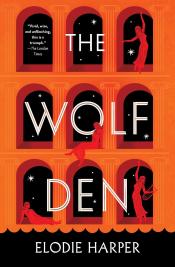
I was not the best because I killed quickly. I was the best because the crowd loved me. Win the crowd and you will win your freedom. — Proximo
The glory battle comes to the library. Enter the Colosseum to watch the gladiators fight to the death... in film and on the page.
Return to Rome in a film following the events of the original Gladiator film (2000). In the original film, Emperor Marcus Aurelius is dead, killed by his own son in a fit of anger after being passed over for the throne. Roman general Maximus Decimus Meridius has faced the murder of his wife and son, enslavement and gladiatorial combat in the Colosseum, and a failed attempt to escape to freedom. Emperor Commodus, paranoid and desperate to win back the favor of the crowds, challenges Maximus to an unfair fight in the Colosseum that ends in both of their deaths.
Sixteen years later, Rome is ruled by corrupt twin emperors and gladiatorial matches and enslavement continue. Familiar characters return as a man called Hanno emulates the late Maximus in the Colosseum, and Lucilla—the daughter of Marcus Aurelius—recognizes him for who he is.
Check out the movie, Gladiator II (2024) to watch the rest of their story unfold.
- If you loved the Gladiator, you might like...
- Image

Of course, if you like the Gladiator, this is a given.
A former Roman General sets out to exact vengeance against the corrupt emperor who murdered his family and sent him into slavery.
Image
Return to Rome in the sequel to The Gladiator.
After his home is conquered by the tyrannical emperors who now lead Rome, Lucius is forced to enter the Colosseum and must look to his past to find strength to return the glory of Rome to its people.
Image
Boasting the largest film set of its time, its chariot race sequence is famous to this day.
A Jewish prince is betrayed and sent into slavery by a Roman friend in 1st-century Jerusalem, but it's not long before he regains his freedom and comes back for revenge.
Image
Fun Fact: At the time of its release, the film drew criticism for "promoting Communism" with its themes of violent slave revolts. The book on which it was based was banned for the same reasons!"
The slave Spartacus survives brutal training as a gladiator and leads a violent revolt against the decadent Roman Republic, as the ambitious Crassus seeks to gain power by crushing the uprising.
Image
Mad Max Beyond Thunderdome (1985)
In the diesel-punk, post-apocalyptic world, you must deal with your conflicts with a fight to the death in a gladiatorial arena—the Thunderdome.
After being exiled from the most advanced town in post-apocalyptic Australia, a drifter travels with a group of abandoned children to rebel against the town's queen.
Image
After the execution of his wife, William Wallace sets off to rebel against a tyrannical king.
Scottish warrior William Wallace leads his countrymen in a rebellion to free his homeland from the tyranny of King Edward I of England.
Image
There is a theme of "don't harm a man's wife and/or child, in case of revenge."
In 1713 Scotland, Rob Roy MacGregor is wronged by a nobleman and his nephew, becomes an outlaw in search of revenge while fleeing the Redcoats, and faces charges of being a Jacobite.
Image
Sadistic tyrant Lord Matsudaira Naritsugu of Akashi may be protected by the Shogun, but this group of samurai is coming for him. Action-packed and bloody.
A group of assassins come together for a suicide mission to kill an evil lord.
Image
"I will have my vengeance" but make it Viking.
A young Viking prince is on a quest to avenge his father's murder.
Image
Action-packed historical fiction.
A historical epic inspired by true events that took place in The Kingdom of Dahomey, one of the most powerful states of Africa in the 18th and 19th centuries.
- Learn about the real gladiators
- Image
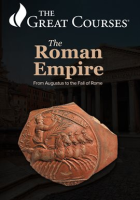
Roman Empire: From Augustus to the Fall of Rome by Gregory S. Aldrete
In 31 BCE, on an otherwise unremarkable afternoon in the Mediterranean, the Roman general Octavian surveyed the aftermath of the ferocious Battle of Actium, where he'd defeated his rival Mark Antony in a war for control of Rome. This moment, in which a military leader rests and reflects on his next move toward becoming the sole leader of the Western world, is the germ out of which grows one of the most breathtaking stories in world history. This leader would soon ingeniously maneuver his way to become Rome's first emperor, setting the stage for five centuries of Roman expansion; warfare; and, ultimately, collapse.
When Octavian, who took the title of Augustus as the first emperor of Rome, defeated Mark Antony to become the sole ruler of the Roman world, it was a major turning point in Western civilization. Not only did his decades-long rule completely transform the old Roman Republic into the Roman Empire, but it also profoundly shaped the culture and history of our world today. The Roman Empire: From Augustus to the Fall of Rome traces this breathtaking history from the empire's foundation by Augustus to its Golden Age in the 2nd century CE through a series of ever-worsening crises until its ultimate disintegration.
Taught by acclaimed Professor Gregory S. Aldrete of the University of Wisconsin–Green Bay, these 24 captivating lectures offer you the chance to experience this story like never before, incorporating the latest historical research, perspectives, and insights that challenge our previous notions of Rome's decline. Professor Aldrete examines the major events and familiar figures of the Roman Empire, including:
- The political innovations of Augustus—and his one major shortcoming;
- The mental instability and cruel acts of Caligula and Nero;
- Writers such as Ovid, Horace, and Virgil;
- The stoic philosophy of Marcus Aurelius;
- Attila the Hun, Alaric, and other “barbarians” who threatened the empire; and
- Christian philosophers such as Augustine and Jerome.
But this course also moves beyond the famous figures and delves deeply into the lives of ordinary Roman women and men. You'll read the messages they left on tombstones or scribbled on walls as graffiti; examine what life was really like for average city-dwellers and the hazards they faced every day; spend a day in Rome's spectacular public entertainments, such as gladiator games and chariot races; and explore some of the city's marvelous architectural and engineering works, including the Pantheon and the aqueducts.
The more you learn about the ancient Romans, the more you will realize how much we still walk in their footsteps. From particulars of the English language to our system of government to our religious practices, we are still experiencing the echoes of the Roman Empire in our world today. Indeed, we cannot truly understand ourselves unless we comprehend the vital influences of Rome on the modern world—and the lessons the empire can still teach us. The Roman Empire: From Augustus to the Fall of Rome is an informative—and highly entertaining—guide to one of the most important periods in world history.
Image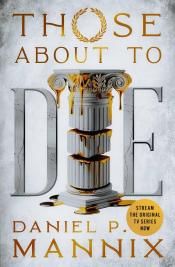
Those About to Die by Daniel P. Mannix
The basis for the new Peacock television series: The classic, in-depth account of the ancient Romans’ obsession with the bloody and brutal gladiatorial games.
“If you can imagine a superior American sports writer suddenly being transported back in time to cover the ancient Roman games, you will have some idea of the flavor and zest of [Those About to Die],” said the Los Angeles Times about Daniel P. Mannix’s century-by-century—and nearly moment-by-moment—narrative of the Roman Empire’s national institution. Putting the games in the context of Rome’s rise and dramatic fall, Mannix captures all the history, planning, and savage pageantry that went into creating the first spectator sports.
The games began in 238 BC as nearly county fair–like entertainment, with trick riding, acrobats, trained animals, chariot racing, and athletic events. The contests then evolved into slave fights thanks to wealthy patricians Marcus and Decimus Brutus, who wanted to give their father an unforgettable funeral by reviving an old tradition. What the brothers wrought, Rome devoured, demanding even greater violence to satisfy the bloodlust of the crowd. Architectural wonders in themselves, massive arenas like Circus Maximus and the Colosseum were built, able to host sea battle reenactments on actual water. Successful gladiators found fame, fortune—and freedom.
But as Rome begin to fall in the fifth century, so did the games, devolving into nothing more than pointless massacres. In the end, millions of humans and animals were sacrificed in barbaric displays. What were once ceremonies given in honor of gods met an inglorious fate, yet they still captivate the imagination of people today.
Image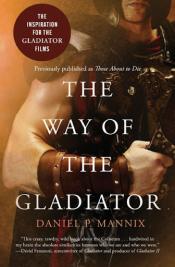
The Way of the Gladiator by Daniel P. Mannix
Hail Caesar, we who are about to die salute you!" And die the gladiators did.
In a vast marble Colosseum larger than Yankee Stadium, the people of Rome, patrician and commoner, flocked to see gladiators mangled beneath the hoofs and wheels of horses and chariots, slaughtered by half-starved wild beasts, and butchered by well-armed and armored professionals. With the Empire in decline, death and torture became the only spectacles that satisfied the decadent Romans' longing.
The Emperor Trajan gave one set of games that lasted 122 days; at its end, 11,000 people and 10,000 animals had been killed. The people of Rome loved it-and they wanted more.
Image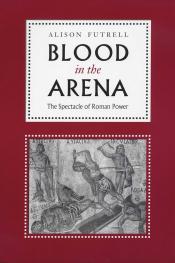
Blood in the Arena: The Spectacle of Roman Power by Alison Futrell
From the center of Imperial Rome to the farthest reaches of ancient Britain, Gaul, and Spain, amphitheaters marked the landscape of the Western Roman Empire. Built to bring Roman institutions and the spectacle of Roman power to conquered peoples, many still remain as witnesses to the extent and control of the empire. In this book, Alison Futrell explores the arena as a key social and political institution for binding Rome and its provinces. She begins with the origins of the gladiatorial contest and shows how it came to play an important role in restructuring Roman authority in the later Republic. She then traces the spread of amphitheaters across the Western Empire as a means of transmitting and maintaining Roman culture and control in the provinces. Futrell also examines the larger implications of the arena as a venue for the ritualized mass slaughter of human beings, showing how the gladiatorial contest took on both religious and political overtones. This wide-ranging study, which draws insights from archaeology and anthropology, as well as Classics, broadens our understanding of the gladiatorial contest and its place within the highly politicized cult practice of the Roman Empire.
Image
Gladiators: Fighting to the Death in Ancient Rome by M. C. Bishop
The gladiator is one of the most enduring figures of Ancient Rome. Heroic, though of lowly status, they fought vicious duels in large arenas filled with baying crowds. The survivor could be either executed (the famous ‘thumbs down’ signal) or spared at the whim of the crowd or the Emperor. Few lasted more than a dozen fights, yet they were a valuable asset to their owners.
But how did they fight and how did their weapons and techniques develop? Who were they? This book gives an entertaining overview of the history of the gladiator, debunking some myths along the way. We learn about the different forms of combat, and the pairings which were designed to carefully balance the strengths and weaknesses of one against the other. The retiarii (with nets) were lightly armed but mobile, the secutores and murmillones were protected but weighed down by their armor. Gladiators also participated in simulated naval battles on large artificial lakes or even in the arena of the Colosseum.
Although their lives were brutal and short, gladiators often were admired for their bravery, endurance, and willingness to die. They were the celebrities of their day. This book reveals what we know and how we know ancient remains, contemporary literature, graffiti, modern attempts to reconstruct ancient fighting techniques and the astonishing discovery at Pompeii where a complete gladiator barracks was found alongside multiple skeletons, telling their story.
Image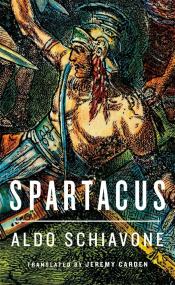
Spartacus (109?-71 BCE), the slave who rebelled against Rome, has been a source of endless fascination, the subject of myth-making in his own time, and of movie-making in ours. Hard facts about the man have always yielded to romanticized tales and mystifications. In this riveting, compact account, Aldo Schiavone rescues Spartacus from the murky regions of legend and brings him squarely into the arena of serious history.
Schiavone transports us to Italy of the first century BCE, where the pervasive institution of slavery dominates all aspects of Roman life. In this historic landscape, carefully reconstructed by the author, we encounter Spartacus, who is enslaved after deserting from the Roman army to avoid fighting against his native Thrace. Imprisoned in Capua and trained as a gladiator, he leads an uprising that will shake the empire to its foundations.
While the grandeur of the Spartacus story has always been apparent, its political significance has been less clear. What were his ambitions? Often depicted as the leader of a class rebellion that was fierce in intent but ragtag in makeup and organization, Spartacus emerges here in a very different light: the commander of an army whose aim was to incite Italy to revolt against Rome and to strike at the very heart of the imperial system. Surprising, persuasive, and highly original, "Spartacus" challenges the lore and illuminates the reality of a figure whose achievements, and whose ultimate defeat, are more extraordinary and moving than the fictions we make from them."
Image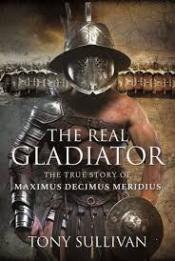
The Real Gladiator: The True Story of Maximus Decimus Meridius by Tony Sullivan
“Are you not entertained?” shouts Russell Crowe, playing the part of General Maximus Decimus Meridius in the Oscar winning 2000 film Gladiator. The crowd, having witnessed Maximus defeating several gladiators, cheer in response. Film goers too were indeed entertained with the film grossing nearly half a billion dollars. This book covers the historical events that film was based on. From the Germanic wars on the northern frontier to the gladiatorial arena in Rome. From the philosopher emperor, Marcus Aurelius to the palace intrigues during the reign of his son. We will discover how Commodus really died and which of the characters actually fought in the arena.
Readers will meet two generals, Pompeianus and Maximianus, who most resemble our hero General Maximus. Also Lucilla, the sister of Commodus, who in reality married her General, but detested him. The book also focuses on warfare, weapons and contemporary battles. It will compare the battle and fight scenes in the film with reality from contemporary sources and modern tests and reenactments.
The reader will discover that fact is not only stranger than fiction, it is often more entertaining. The real history was certainly as much, if not more, treacherous, bloodthirsty, murderous and dramatic than anything the film industry has created. Anyone who answered “yes!” to the question posed by Russell Crowe’s character in the film, will indeed be entertained by this book.
Image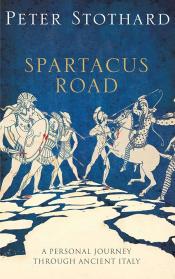
The Spartacus Road: A Journey Through Ancient Italy by Peter Stothard
Today, his struggle is widely perceived as the fight for freedom, but this hasn't always been the case; the ancient Romans were embarrassed by Spartacus's victories over them; the Greeks admired him; and others viewed his uprisings as the embodiment of cruelty.In this fascinating and original work, Stothard retraces the journey taken by Spartacus and his army of rebels, taking us back to an ancient world which confronted similar issues to those we face todayImage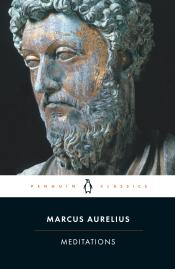
Meditations by Marcus Aurelius
This new translation of Meditations by Marcus Aurelius presents the personal reflections of one of Rome's most significant emperors. Marcus Aurelius, emperor and Stoic philosopher, explores fundamental questions of existence in this work. His writings cover topics such as ethics, duty, and the nature of the universe. The book provides insight into the emperor's approach to reconciling philosophical ideals with the realities of governance and personal challenges.
- Read-Alikes for fans of gladitorial combat
- Image
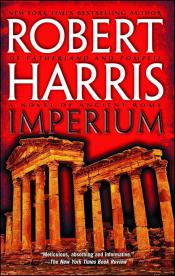
When Tiro, the confidential secretary (and slave) of a Roman senator, opens the door to a terrified stranger on a cold November morning, he sets in motion a chain of events that will eventually propel his master into one of the most suspenseful courtroom dramas in history. The stranger is a Sicilian, a victim of the island's corrupt Roman governor, Verres. The senator is Marcus Cicero—an ambitious young lawyer and spellbinding orator, who at the age of twenty-seven is determined to attain imperium—supreme power in the state.
Of all the great figures of the Roman world, none was more fascinating or charismatic than Cicero. And Tiro—the inventor of shorthand and author of numerous books, including a celebrated biography of his master (which was lost in the Dark Ages)—was always by his side.
Compellingly written in Tiro's voice, Imperium is the re-creation of his vanished masterpiece, recounting in vivid detail the story of Cicero's quest for glory, competing with some of the most powerful and intimidating figures of his—or any other—age: Pompey, Caesar, Crassus, and the many other powerful Romans who changed history.
Robert Harris, the world's master of innovative historical fiction, lures us into a violent, treacherous world of Roman politics at once exotically different from and yet startlingly similar to our own—a world of Senate intrigue and electoral corruption, special prosecutors and political adventurism—to describe how one clever, compassionate, devious, vulnerable man fought to reach the top.
Image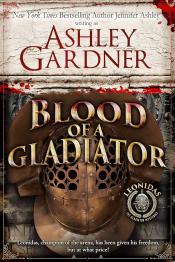
Blood of a Gladiator by Ashley Gardner
Leonidas, champion gladiator of Rome, is set free from the games by a mysterious benefactor who grants him freedom, a place to live, and a servant—Cassia, a scribe—to look after him.
But the benefactor is only so generous—Leonidas must pay his own way and Cassia’s, which means hiring himself out. The sharp-witted Cassia quickly lands him a post as a bodyguard, escorting a retired senator to Ostia.
The trip soon turns deadly, as Leonidas and Cassia find themselves squarely in the middle of intrigue that reaches from the slums of the Subura to the Palatine Hill and the emperor Nero himself.
Image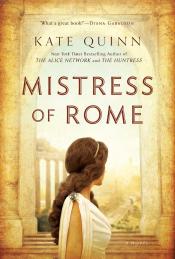
Mistress of Rome by Kate Quinn
First-century Rome: A ruthless emperor watches over all--and fixes his gaze on one young woman...
Thea is a slave girl from Judaea, purchased as a toy for the spiteful heiress Lepida Pollia. Now she has infuriated her mistress by capturing the attention of Rome's newest and most savage gladiator--and though his love brings Thea the first happiness of her life, their affair ends quickly when a jealous Lepida tears them apart.
Remaking herself as a singer for Rome's aristocrats, Thea unwittingly attracts another admirer: the charismatic Emperor of Rome. But the passions of an all-powerful man come with a heavy price, and Thea finds herself fighting for both her soul and her sanity. Many have tried to destroy the Emperor: a vengeful gladiator, an upright senator, a tormented soldier, a Vestal Virgin. But in the end, the life of Domitian lies in the hands of one woman: the Emperor's mistress.
Sold by her mother. Enslaved in Pompeii's brothel. Determined to survive. Her name is Amara. Welcome to the Wolf Den...
Amara was once a beloved daughter, until her father's death plunged her family into penury. Now she is a slave in Pompeii's infamous brothel, owned by a man she despises. Sharp, clever and resourceful, Amara is forced to hide her talents. For as a she-wolf, her only value lies in the desire she can stir in others.
But Amara's spirit is far from broken.
By day, she walks the streets with her fellow she-wolves, finding comfort in the laughter and dreams they share. For the streets of Pompeii are alive with opportunity. Out here, even the lowest slave can secure a reversal in fortune. Amara has learned that everything in this city has its price. But how much is her freedom going to cost her?
Set in Pompeii's lupanar, The Wolf Den reimagines the lives of women who have long been overlooked.
Image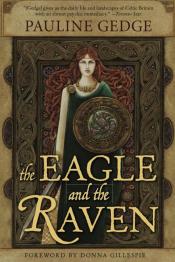
The Eagle and the Raven by Pauline Gedge
Image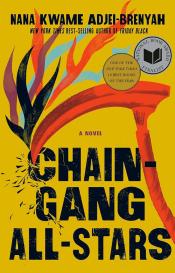
Chain-Gang All-Stars by Nana Kwame Adjei-Brenyah
Two top women gladiators fight for their freedom within a depraved private prison system not so far-removed from America's own.
Loretta Thurwar and Hamara "Hurricane Staxxx" Stacker are the stars of Chain-Gang All-Stars, the cornerstone of CAPE, or Criminal Action Penal Entertainment, a highly-popular, highly-controversial, profit-raising program in America's increasingly dominant private prison industry. It's the return of the gladiators and prisoners are competing for the ultimate prize: their freedom.
In CAPE, prisoners travel as Links in Chain-Gangs, competing in death-matches for packed arenas with righteous protestors at the gates. Thurwar and Staxxx, both teammates and lovers, are the fan favorites. And if all goes well, Thurwar will be free in just a few matches, a fact she carries as heavily as her lethal hammer. As she prepares to leave her fellow Links, she considers how she might help preserve their humanity, in defiance of these so-called games, but CAPE's corporate owners will stop at nothing to protect their status quo and the obstacles they lay in Thurwar's path have devastating consequences.
Moving from the Links in the field to the protestors to the CAPE employees and beyond, Chain-Gang All-Stars is a kaleidoscopic, excoriating look at the American prison system's unholy alliance of systemic racism, unchecked capitalism, and mass incarceration, and a clear-eyed reckoning with what freedom in this country really means.
Image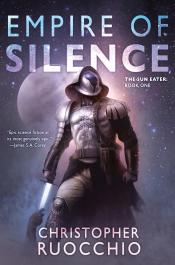
Empire of Silence by Christopher Ruocchio
Hadrian Marlowe, a man revered as a hero and despised as a murderer, chronicles his tale in the galaxy-spanning debut of the Sun Eater series, merging the best of space opera and epic fantasy.
It was not his war. On the wrong planet, at the right time, for the best reasons, Hadrian Marlowe started down a path that could only end in fire. The galaxy remembers him as a the man who burned every last alien Cielcin from the sky. They remember him as a the devil who destroyed a sun, casually annihilating four billion human lives—even the Emperor himself—against Imperial orders.But Hadrian was not a hero. He was not a monster. He was not even a soldier. Fleeing his father and a future as a torturer, Hadrian finds himself stranded on a strange, backwater world. Forced to fight as a gladiator and into the intrigues of a foreign planetary court, he will find himself fight a war he did not start, for an Empire he does not love, against an enemy he will never understand.
Image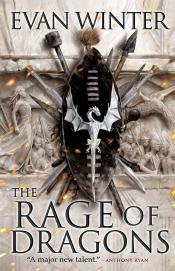
The Rage of Dragons by Evan Winter
The Omehi people have been fighting an unwinnable fight for almost two hundred years. Their society has been built around war and only war. The lucky ones are born gifted. One in every two thousand women has the power to call down dragons. One in every hundred men is able to magically transform himself into a bigger, stronger, faster killing machine.
Everyone else is fodder, destined to fight and die in the endless war. Young, gift-less Tau knows all this, but he has a plan of escape. He's going to get himself injured, get out early, and settle down to marriage, children, and land. Only, he doesn't get the chance. Those closest to him are brutally murdered, and his grief swiftly turns to anger. Fixated on revenge, Tau dedicates himself to an unthinkable path. He'll become the greatest swordsman to ever live, a man willing to die a hundred thousand times for the chance to kill the three who betrayed him.
Image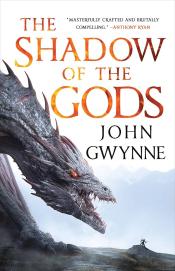
The Shadow of the Gods by John Gwynne
Set in a brand-new, Norse-inspired world, and packed with myth, magic and bloody vengeance, The Shadow of the Gods begins an epic new fantasy saga from bestselling author John Gwynne.
After the gods warred and drove themselves to extinction, the cataclysm of their fall shattered the land of Vigrið.
Now a new world is rising, where power-hungry jarls feud and monsters stalk the woods and mountains. A world where the bones of the dead gods still hold great power for those brave - or desperate - enough to seek them out.
Now, as whispers of war echo across the mountains and fjords, fate follows in the footsteps of three people: a huntress on a dangerous quest, a noblewoman who has rejected privilege in pursuit of battle fame, and a thrall who seeks vengeance among the famed mercenaries known as the Bloodsworn.
All three will shape the fate of the world as it once more falls under the shadow of the gods . . .
Image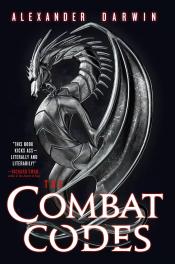
The Combat Codes by Alexander Darwin
In a world where battle-hardened warriors determine the fate of empires, war-ravaged nations seek out a new champion in the first book of a thrilling science fantasy "that rare book that fully satisfies me as an action fan" (Fonda Lee, author of Jade City ).
In a world long ago ravaged by war, the nations have sworn an armistice never to use weapons of mass destruction again. Instead, highly-skilled warriors known as Grievar Knights represent their nations’ interests in brutal hand-to-hand combat.
Murray Pearson was once a famed Knight until he suffered a loss that crippled his homeland — but now he’s on the hunt to discover the next champion.
In underground and ruthless combat rings, an orphaned boy called Cego is making a name for himself. Murray believes Cego has what it takes to thrive in the world's most prestigious combat academy – but first, Cego must prove himself in the vicious arenas of the underworld. And survival isn’t guaranteed.
Image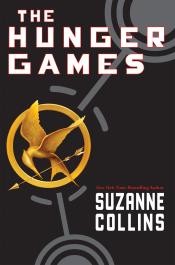
The Hunger Games by Suzanne Collins
Could you survive on your own in the wild, with every one out to make sure you don't live to see the morning?
In the ruins of a place once known as North America lies the nation of Panem, a shining Capitol surrounded by twelve outlying districts. The Capitol is harsh and cruel and keeps the districts in line by forcing them all to send one boy and one girl between the ages of twelve and eighteen to participate in the annual Hunger Games, a fight to the death on live TV.
Sixteen-year-old Katniss Everdeen, who lives alone with her mother and younger sister, regards it as a death sentence when she steps forward to take her sister's place in the Games. But Katniss has been close to dead before—and survival, for her, is second nature. Without really meaning to, she becomes a contender. But if she is to win, she will have to start making choices that weight survival against humanity and life against love.
Image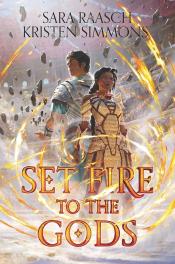
Set Fire to the Gods by Sara Raasch and Kristen Simmons
Ash is descended from a long line of gladiators, and she knows the brutal nature of war firsthand. But after her mother dies in an arena, she vows to avenge her by overthrowing her fire god, whose temper has stripped her country of its resources.
Madoc grew up fighting on the streets to pay his family's taxes. But he hides a dangerous secret: he doesn't have the earth god’s powers like his opponents. His elemental gift is something else—something that hasn't been seen in centuries.
When an attempted revenge plot goes dangerously wrong, Ash inadvertently throws the fire and earth gods into a conflict that can only be settled by deadly, lavish gladiator games. The fights put Madoc in Ash's path, and she realizes that his powers are the weapon her rebellion needs—but Madoc won’t jeopardize his family, regardless of how intrigued he is by the beautiful warrior.
But when the gods force Madoc’s hand, he and Ash uncover an ancient war that will threaten more than one immortal—it will unravel the world.
